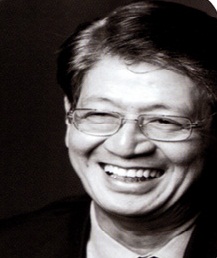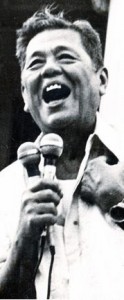Two great Filipinos: Pepe Diokno and Boy Morales
SAN FRANCISCO—The last few weeks have been a time for reflection on two great Filipinos.
Pepe Diokno would have turned 90 last month. February also marked the 25th anniversary of his death in 1987. Last week, Horacio “Boy” Morales passed away after a long illness. He was 68.
News of Morales’s death reached me through a text message from my friend Joey Ochave.
“Just learned of Boy Morales’s death,” Joey, a former activist and now a corporate executive, said. “Apektado ako. I still remember how we looked up to him during those days. He will be remembered.”
In the same way that we still remember Pepe Diokno as the most brilliant and admirable of the opposition leaders during the fight against tyranny.
In the 1980s, Ka Pepe and BM, as Boy Morales was fondly called, were among the most fascinating political figures in the country.
They were identified with different political forces and beliefs. But in many ways, they symbolized an important narrative in our history: that of privileged Filipinos who chose to align themselves with the poor and powerless in our country.
Pepe Diokno had been a bar topnotcher, a respected senator and a much-admired campaigner against corruption before martial law, before Ferdinand Marcos’s reign of terror began.
During those dark years, to many young Filipinos like me, Ka Pepe emerged as a courageous warrior in the fight against the Marcos terror.
He became an outspoken critic of US support for the regime, and of American military presence at Subic and Clark. He was a tireless defender of human rights, representing Filipinos from all walks of life in often one-sided court battles with the dictatorship.
Ka Pepe became a regular speaker at U.P. Diliman where I was a student, and at rallies throughout Manila. We saw him as a political giant of the democracy movement, a leader who came from the elite class who, in the long and bitter struggle against dictatorship, chose to fight alongside ordinary Filipinos, from students like us to factory workers and farmers.
Ka Pepe won our respect for his humility. In fact, the last time I saw him, he didn’t have any teeth – and he said so himself.
“Wala kong ngipin ha.” He was grinning as he greeted his visitors at the Diokno residence in New Manila. We were mostly activists from the cause-oriented groups he had worked with in the struggle for democracy. We were there to pay him an informal visit and tribute. And though he was already ill, he was more than glad to welcome us.
I firmly believe that had historical events unfolded differently, and had he been given the opportunity, Pepe Diokno could have been the greatest of Philippine presidents — the perfect political figure to lead the Philippines in the transition from tyranny to democracy.
He could have been our Nelson Mandela.
Young Filipinos hoping to catch a glimpse of Ka Pepe’s brilliance and passion should watch “To Sing Our Own Song,” the 1983 British documentary that exposed the abuses of the Marcos regime. (The film can be viewed online here. https://www.youtube.com/pinoyhistory)
The film was narrated by Ka Pepe who eloquently explained and denounced the system of injustice Marcos and his cronies perpetrated under martial law.
Also featured in the film was Boy Morales, who was then representing the National Democratic Front.
His death capped a long, fascinating and controversial journey. Sadly, the part of his journey that many young Filipinos are familiar with was his stint as a government official of the ill-fated and disastrous administration of Joseph Estrada.
But to many from my generation, as my friend Joey expressed in his text message, Boy Morales was a hero.
Boy was the prominent young technocrat who could have pursued a promising and lucrative career in government or the private sector during the Marcos years.
But Boy gave all that up to take on a brutal dictatorship. And he did so in dramatic fashion.
One night in 1977, BM stunned the nation.
He was one that year’s Ten Outstanding Young Men awardees. But instead of showing up at the ceremony to accept the award, his mother came to speak on his behalf. She announced that Boy had joined the underground movement.
Boy was later captured, tortured and imprisoned. After his release after the 1986 revolt, he plunged back into social advocacy work, helping revive the Philippine Rural Reconstruction Movement and building a new progressive force with a more open-minded and flexible worldview.
Like other leftwing movements in Latin America and other regions, activists like Boy and his friend Edicio de la Torre began to look beyond the rigid and violent politics of the UG movement.
The UG movement had created a vibrant progressive activist culture which has changed Philippine politics. But it also has been led by hard-line cadres with incredible capacity for cruelty and dogmatism.
Boy and his allies explored other paths.
But his decision to align himself with Erap remains controversial. I still don’t completely understand what happened.
At his wake in Marikina, Ed de la Torre affirmed what he and Boy have said through the years: Erap’s supposedly pro-poor politics offered an opening for progressives to push for meaningful social and economic reforms.
That point is still being debated today. After all, Erap’s government collapsed amid charges of corruption and images of an administration run by a Mafia-style clique. Boy and Edicio were denounced as traitors.
But then People Power 2 did not exactly lead to the promised era of good and clean governance. Gloria Arroyo’s administration turned out to be another catastrophe.
Despite the debates, one thing is clear: many Filipinos like me will never ever doubt the sincerity, the desire to serve of people like BM and Edicio.
Finding answers to our country’s complex problems is a long and difficult process. But in the darkest hours of the Marcos dictatorship, people like Boy Morales and Pepe Diokno courageously took a stand despite enormous risks and led the way.
Watching Ka Pepe’s final comments in “To Sing Our Own Song” still makes me choke up.
He ends the documentary by urging the people of the developed world to “prevail upon your governments to stop supporting repressive governments like the one in my country…”
“But whether your governments do or not, I know my people … whatever your governments do, whatever our own elites and our rulers do, and even if we have to wade through blood and fire, we will be free. We will develop. We will build our own societies. We will sing our own songs.”
On Twitter @KuwentoPimentel. On Facebook at www.facebook.com/benjamin.pimentel

